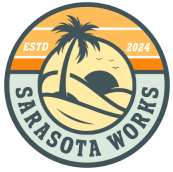Introduction
Navigating the job search landscape can be challenging in today’s competitive market. While your skills and qualifications are paramount, understanding and practicing proper job search etiquette is equally crucial.
Demonstrating professionalism at every stage of the job search process can set you apart from other candidates and leave a lasting positive impression on potential employers.
In this blog post, we’ll explore key aspects of job search etiquette that can enhance your efforts and boost your chances of success.

Join over 12,836 active members in our Facebook Group : https://www.facebook.com/groups/sarasotaworks
Chapter 1: Understanding Professionalism in the Job Search
Defining Professionalism in the Context of Job Seeking
Professionalism is about more than dressing appropriately for an interview or sending a polite email. It encompasses your overall conduct, demeanor, and the way you present yourself throughout the job search process.
From the first interaction with a potential employer to the follow-up after an interview, professionalism is a blend of etiquette, communication, and reliability.
The Importance of First Impressions
First impressions carry significant weight in the hiring process. Research indicates that employers often form opinions about candidates within the first few minutes of an interaction. Whether you’re attending a job fair, sending an application email, or meeting for an interview, those initial moments can set the tone for the entire engagement.
A positive first impression can pave the way for further opportunities, while a negative one can close doors before you’ve had a chance to showcase your abilities.
Chapter 2: Crafting Your Professional Online Presence
Tips for Optimizing Social Media Profiles for Job Searching
Your online presence is often the first impression prospective employers will have of you. Ensure your social media profiles are professional and reflect your career aspirations. Here are some tips to optimize your profiles:
- LinkedIn: Keep your profile updated with your latest experiences and skills. Use a professional photo and write a compelling summary that highlights your achievements and career goals.
- Twitter: If you use Twitter for professional purposes, ensure your tweets are relevant to your industry. Engage with thought leaders and participate in relevant discussions.
- Facebook/Instagram: While these platforms are typically more personal, consider tightening your privacy settings and be mindful of the content you share publicly.
The Dos and Don’ts of Networking on Professional Platforms
Networking is a powerful tool in the job search arsenal, but it must be done thoughtfully. Here are some do’s and don’ts:
- Do: Personalize your connection requests. Mention how you know the person or why you want to connect.
- Do: Engage with content by liking, sharing, or commenting on posts relevant to your field.
- Don’t: Spam professionals with generic connection requests or messages.
- Don’t: Post controversial or unprofessional content that could detract from your professional image.

Chapter 3: Navigating the Application and Interview Process
Best Practices for Writing a Professional Resume and Cover Letter
Your resume and cover letter are often your first formal introduction to a potential employer. Ensure they are polished and professional:
- Resume: Tailor your resume to each job you apply for, highlighting relevant experiences and skills. Use clear, concise language and ensure there are no spelling or grammatical errors.
- Cover Letter: Write a personalized cover letter for each application. Address the hiring manager by name, if possible, and mention specific details about the company and role. Show enthusiasm and explain why you are a good fit.
How to Prepare for an Interview to Showcase Professionalism and Preparedness
Preparation is key to demonstrating professionalism during an interview:
- Research: Learn about the company’s history, culture, products, and recent news. Understand the job description and how your skills align with the role.
- Practice: Conduct mock interviews to practice your responses. Pay attention to your body language, tone, and clarity.
- Dress: Choose attire that is appropriate for the company’s dress code. It’s better to be slightly overdressed than underdressed.
- Punctuality: Arrive early to the interview location. This shows respect for the interviewer’s time and demonstrates reliability.

Chapter 4: Following Up and Maintaining Professional Relationships
The Art of a Post-Interview Thank-You Note
A thoughtful thank-you note can reinforce your interest in the position and leave a positive impression. Here are some tips:
- Timing: Send the thank-you note within 24 hours of the interview.
- Content: Express gratitude for the opportunity to interview, mention specific points discussed during the interview, and reiterate your enthusiasm for the role.
- Format: While an email is appropriate in most cases, a handwritten note can add a personal touch if you feel it’s suitable.
How to Follow Up Respectfully Without Being Pushy
Following up is essential, but it must be done tactfully:
- Initial Follow-Up: If you haven’t heard back within the timeframe mentioned by the interviewer, send a polite follow-up email inquiring about your application status.
- Continued Communication: If there are further delays, maintain a respectful cadence in your follow-ups. Avoid sending multiple messages in quick succession.
- Networking: Even if you don’t get the job, stay connected with the professionals you met during the process. You never know when another opportunity might arise.
Conclusion
Job search etiquette is a blend of professionalism, communication, and thoughtful behavior that can significantly impact your success in landing a job. By understanding and applying these principles, you can make a lasting positive impression on potential employers.
Remember, every interaction is an opportunity to demonstrate your best self. Stay professional, stay prepared, and most importantly, stay positive. Good luck on your job search journey!
We’d love to hear your thoughts. Share your experiences with job search etiquette in the comments below, and let’s continue the conversation.


